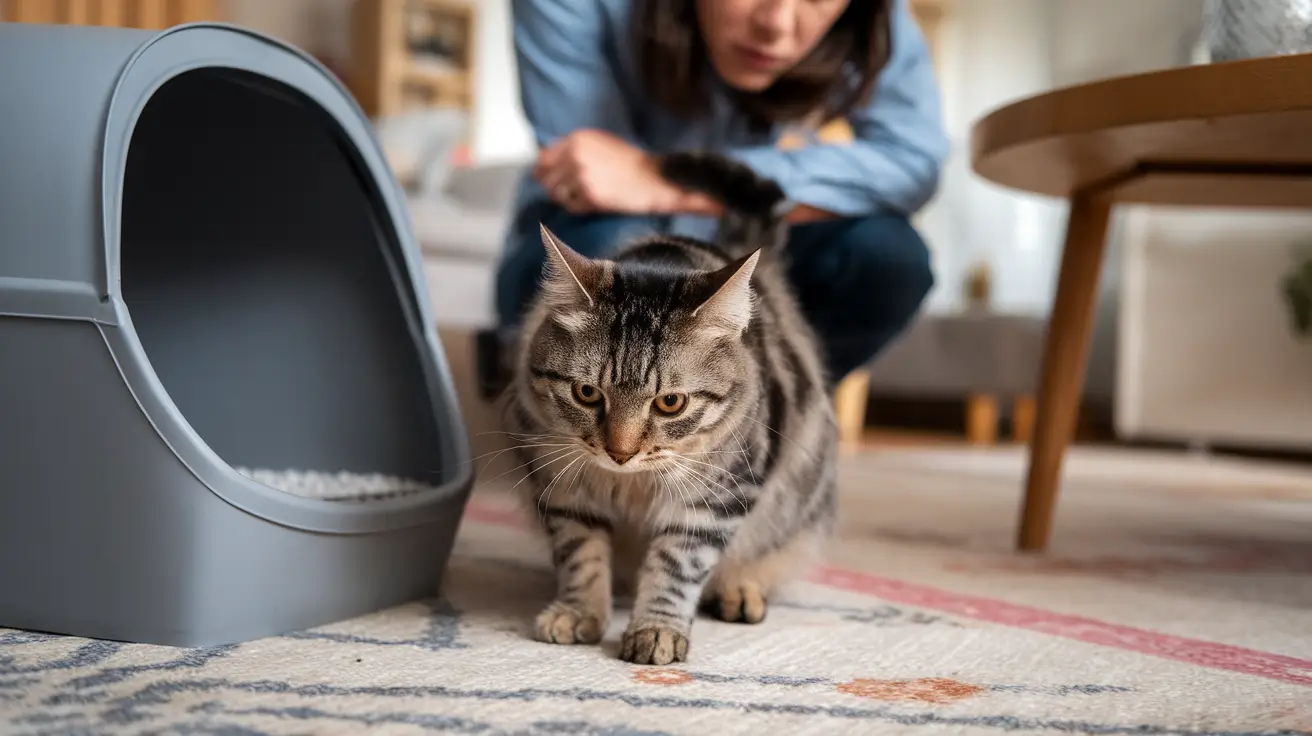猫の健康トラブルを知る:はじめに
猫は不調を隠しやすい動物のため、日頃から健康状態を見守ることがとても重要です。数ある健康問題の中でも、便秘はよく見られる一方で見過ごされやすいトラブルです。軽い問題に思えても、放置するとより深刻な健康状態につながることがあります。便秘の重要性を理解し、猫の全身の健康にどのような影響が出得るのかを知っておくことは、すべての飼い主さんにとって欠かせません。
便秘のサインを見分ける
猫の便秘は早期に気づくことで合併症を防ぎやすくなります。代表的な症状は、排便時にいきむ、少量で硬い便しか出ない、トイレの回数や滞在時間などトイレ習慣が変わる、などです。便秘でつらいときは、食欲低下や元気がない(活動性の低下)といった行動の変化が見られることもあります。これらのサインに注意深く気づき、早めに対応することで、適切な解決策につなげられます。
猫の便秘を引き起こす主な原因
水分と食事
脱水は猫の便秘の大きな要因です。十分に水を飲めない状態が続くと(慢性腎臓病などで起こりやすいこともあります)、体が大腸から水分を再吸収し、便が乾燥して硬くなります。また、食物繊維や水分が少ない食事、特にドライフード中心の食生活は、便秘を助長することがあります。
病気(基礎疾患)
猫の正常な排便を妨げる病気はいくつもあります。甲状腺機能低下症のような代謝性の異常や、血中カリウム・カルシウムのバランス異常は、大腸の収縮力に影響することがあります。脊椎の問題や慢性腎臓病も、腸の働きを乱して便秘のリスクを高める要因になります。
生活習慣の影響
肥満やストレスは、猫の腸の健康に大きく影響します。体重過多は腸の炎症を招き、蠕動(ぜんどう)運動を鈍らせることがあります。同様に、ストレスや不安によって排便リズムが乱れ、便秘につながることがあります。
物理的な閉塞
骨やひもなどの異物を飲み込むと、大腸が詰まって正常に排便できなくなることがあります。また、巨大結腸症(結腸が著しく拡張する状態)のように重症化しやすい病態では、重篤なケースもあるため獣医師の介入が必要になることが少なくありません。
自宅でできる対処(ホームケア)
食事の見直し
便秘の改善は、食事を見直すことから始まる場合が多いです。ウェットフードを取り入れると水分摂取量が増え、脱水の予防に役立ちます。さらに、食物繊維のサプリメントや高繊維の食品(例:かぼちゃのピューレ/かぼちゃ缶)を少量加えることで、より健康的な排便をサポートできます。
プロバイオティクスと自然由来のケア
プロバイオティクスは腸内フローラの健康を支え、規則的な排便に役立つことがあります。ショウガやアロエベラジュースなどの自然由来の“緩下”作用があるものを、量に注意して用いることで腸の動きを促す場合もあります。こうした方法は、便秘に対して比較的やさしい選択肢となり得ます。
運動を増やし、ストレスを減らす
遊びや運動で活動量を増やすと、腸の働きが高まりやすくなります。加えて、フェロモン製剤やサプリメントなどでストレスを和らげることも、排便の安定に役立ちます。ストレスは便秘を悪化させることがあるため、環境面のケアも重要です。
観察と日常管理
日々の観察
トイレでの様子を継続的に観察することはとても大切です。排便の頻度や便の硬さ・量を把握しておくと、便秘の初期サインを見つけやすくなり、早めの対応につながります。
動物病院に相談する目安
いつ獣医師に相談すべきかを知っておくことも重要です。便秘が長引く場合や、痛がる・苦しそうなど不快感のサインがある場合は、専門的な評価が必要です。獣医師は基礎疾患の有無を含めて診断し、適切な治療方針を提案できます。
獣医師による専門的な治療
検査(診断)
獣医師は便秘の原因を特定するために、必要な検査を行うことがあります。原因を明らかにすることで、より的確な治療につながり、特別な介入が必要な基礎疾患の発見にも役立ちます。
治療の選択肢
自宅ケアで改善しない場合、点滴などの輸液治療や浣腸が必要になることがあります。症状に応じて緩下剤などの薬が処方される場合もあります。これらの処置は合併症を避けるためにも、必ず獣医師の指示に従って行うことが重要です。
まとめ:愛猫の健やかな毎日のために
猫の便秘は、原因を理解し、自宅でできる有効なケアを取り入れ、受診のタイミングを見極めるという“総合的な管理”が大切です。飼い主さんが先回りして気づき、丁寧に見守ることで、便秘がより深刻な状態へ進むのを防ぎ、愛猫が健康で快適に過ごせる毎日につながります。






